

Last updated on

If you’re not utilizing ChatGPT for keyword research, you’re overlooking a valuable resource. With ChatGPT, you can grasp an entire topic in mere seconds, saving you time that would otherwise be spent on hours of research.
In this piece, I detail my top ChatGPT prompts for effective keyword research, explaining how I craft them to yield insightful results. By following my approach, you’ll be equipped to leverage, modify, and refine these prompts to suit your specific needs.
However, it’s essential to note that while ChatGPT can be a powerful tool for keyword research, it shouldn’t completely replace traditional methods or dedicated keyword research tools. These approaches should complement each other for comprehensive and accurate results.
ChatGPT can occasionally make errors. It’s capable of generating novel keywords when provided with the appropriate prompt. For instance, I once tasked it with suggesting a unique keyword for the topic of ‘SEO’ that hadn’t been used before.
The result was ‘Interstellar Internet SEO: Optimizing content for the hypothetical notion of an interstellar internet, while considering the complexities of space-time and interplanetary communication delays.’
While I’m tempted to update my LinkedIn profile to ‘Interstellar Internet SEO Consultant,’ it’s unlikely anyone has searched for that (and probably never will)!
It’s crucial not to blindly trust the information provided by ChatGPT. However, where ChatGPT excels is in the initial stages of topic ideation for keyword research and sparking inspiration.
ChatGPT is a sophisticated language model trained extensively to predict the next word in a sentence accurately. However, it doesn’t possess the capability to conduct keyword research at this stage.
Instead, you can think of ChatGPT as having an expert on any subject, armed with information, provided you ask the right question.
In this guide, I’ll teach you precisely that – the crucial prompts necessary for conducting topical keyword research.
These ChatGPT keyword research prompts are versatile and applicable to any niche, even if you’re entirely new to the subject.
To illustrate these prompts, let’s use the topic of “SEO” for this demonstration.
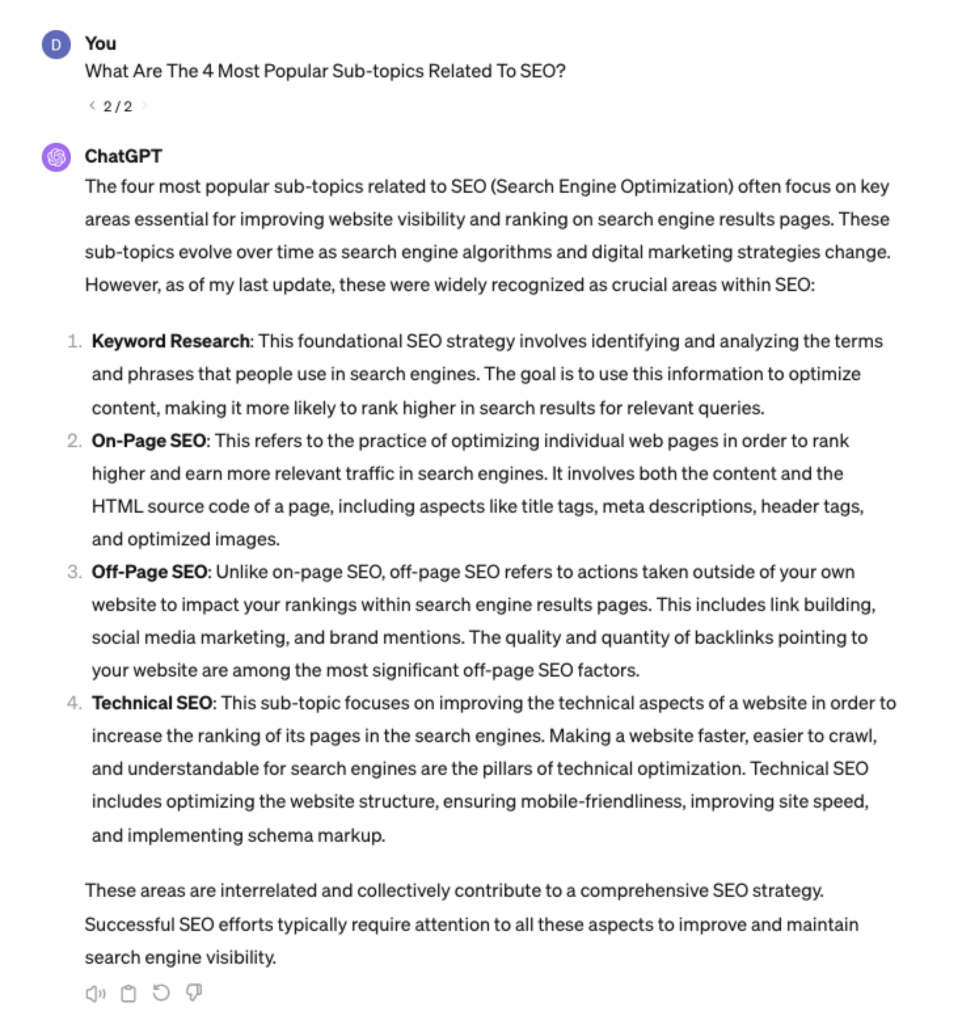
The initial prompt aims to provide you with an overview of the niche.
As demonstrated earlier, ChatGPT adeptly dissected SEO into three primary pillars: on-page, off-page, and technical.
The next step involves taking one of these topics identified by ChatGPT and delving into its sub-topics.
In this instance, let’s inquire, “What are the most popular sub-topics related to keyword research?”
Given my extensive experience in keyword research spanning over a decade, I anticipate receiving information related to keyword research metrics, various types of keywords, and user intent.
Let’s see how it performs.
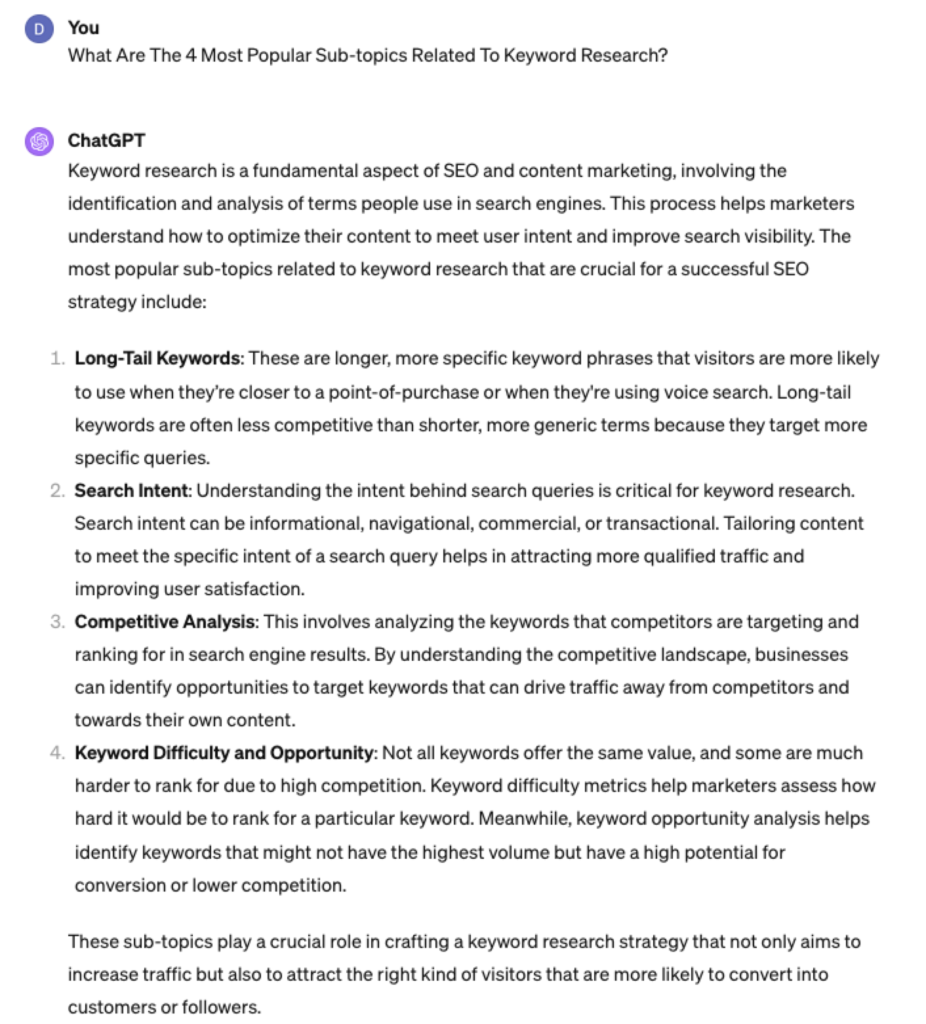
Once again, it delivers precisely what I expected.
To obtain the desired keywords without ChatGPT providing a detailed description for each, I’ll use the prompt “list without description.”
Here’s an example of that.
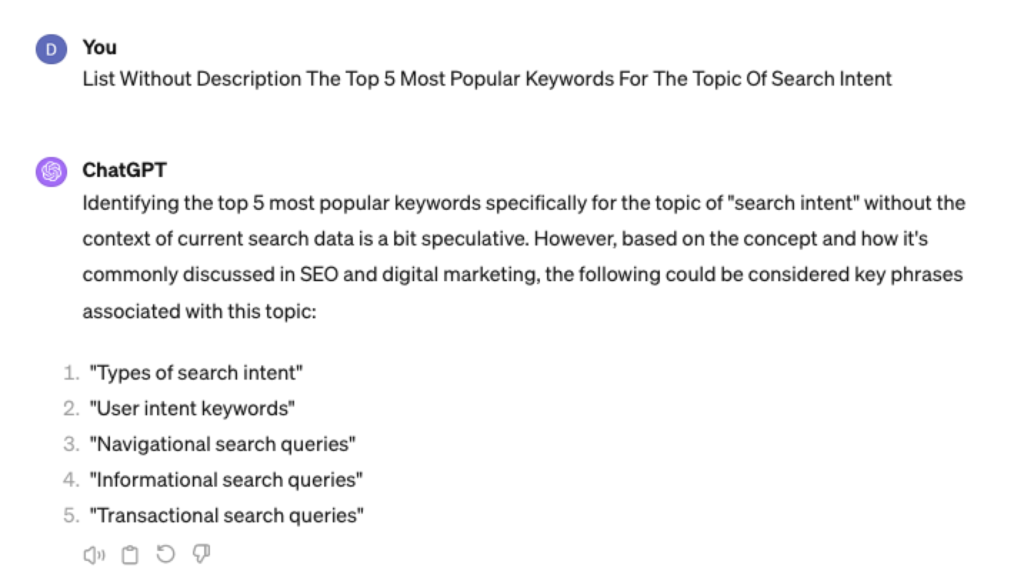
You can further expand on these keywords to explore their long-tail variations.
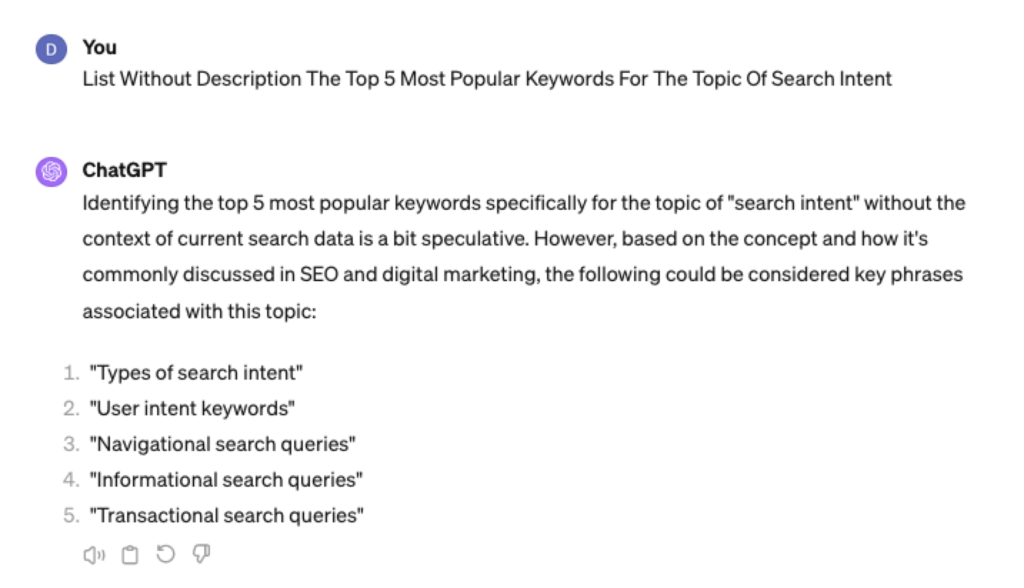
You can also ask ChatGPT to generate semantically related keywords and entities for any given topic!
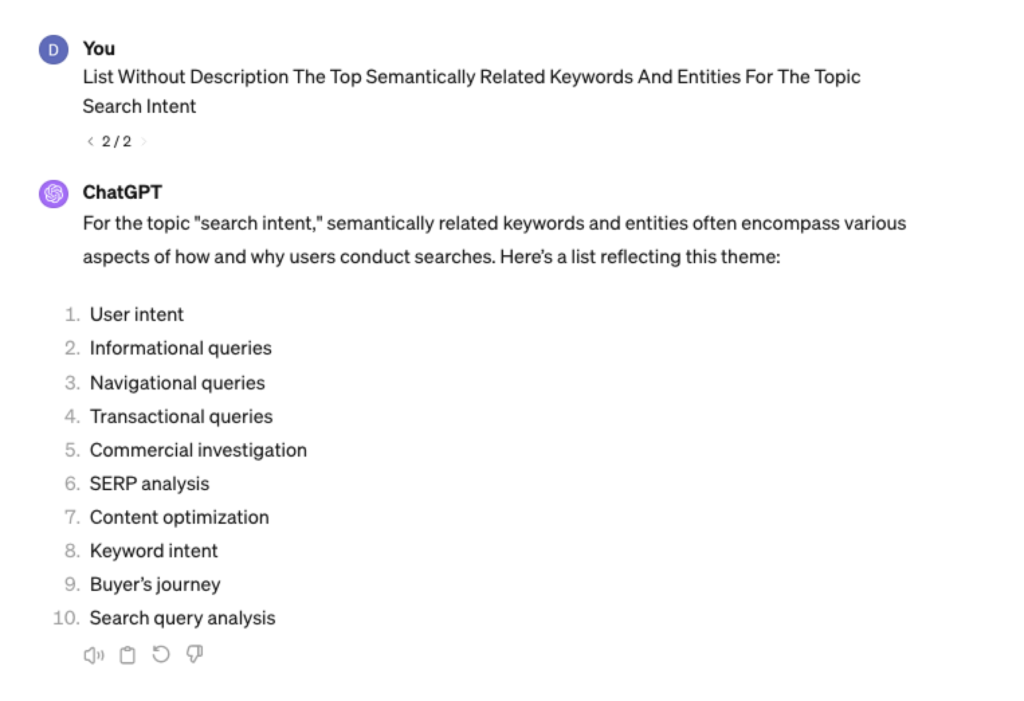
When you’re satisfied with a sequence of prompts, combine them into a single prompt. For instance, in this article, we’ve queried ChatGPT with the following:
By consolidating these prompts, you can streamline the interaction and gather comprehensive insights efficiently.
Combine all five into one prompt by telling ChatGPT to perform a series of steps. Example:
“Perform the following steps in a consecutive order Step 1, Step 2, Step 3, Step 4, and Step 5”
Example:
“Perform the following steps in a consecutive order Step 1, Step 2, Step 3, Step 4 and Step 5. Step 1 – Generate an answer for the 3 most popular sub-topics related to {Topic}?. Step 2 – Generate 3 of the most popular sub-topics related to each answer. Step 3 – Take those answers and list without description their top 3 most popular keywords. Step 4 – For the answers given of their most popular keywords, provide 3 long-tail keywords. Step 5 – for each long-tail keyword offered in the response, a list without descriptions 3 of their top semantically related keywords and entities.”
Perform the following steps in a consecutive order: Step 1 – Generate 10 questions about “What is SEO?”. Step 2 – Generate 5 more questions about “What is SEO?” that do not repeat the above. Step 3 – Generate 5 more questions about “What is SEO?” that do not repeat the above. Step 4 – Based on the above Steps 1, 2, 3 suggest a final list of questions avoiding duplicates or semantically similar questions.
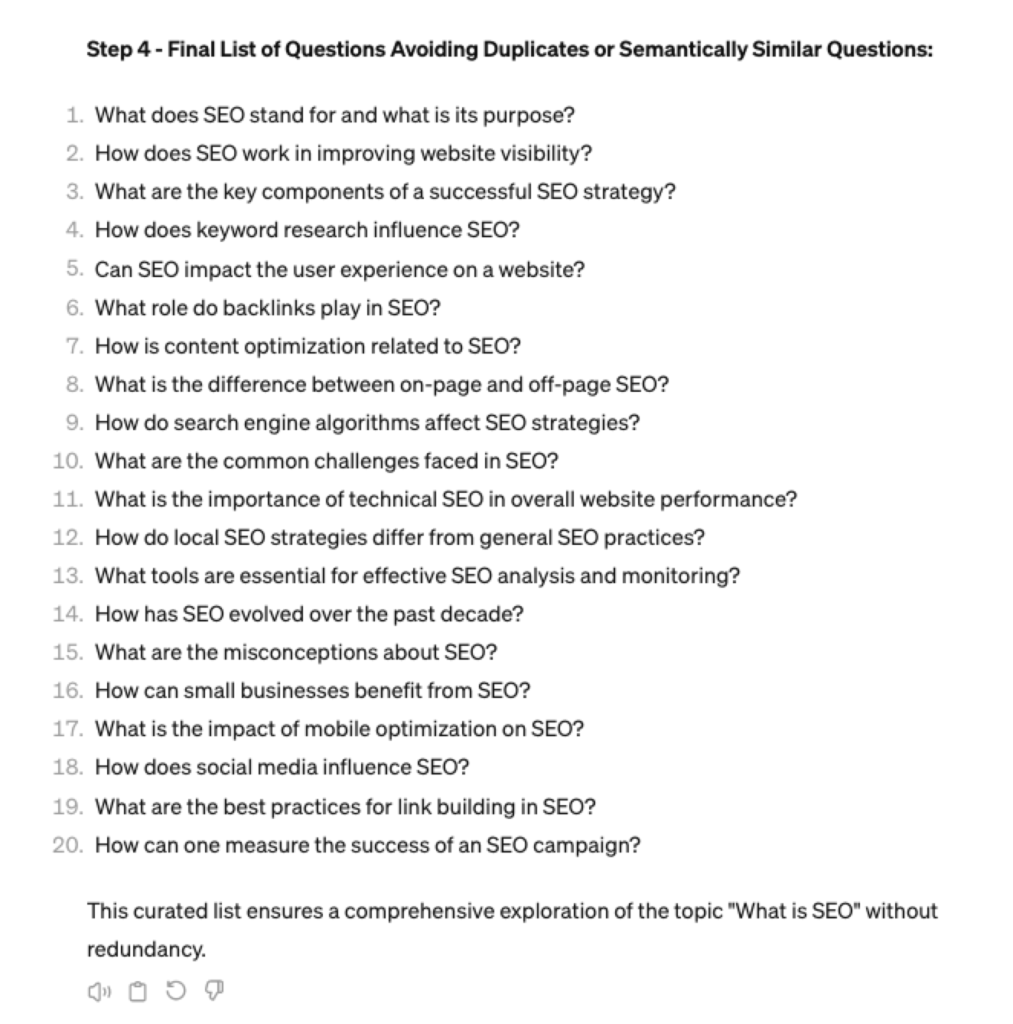
One of my preferred approaches, even without resorting to a keyword research tool, is to derive keyword ideas from Google autocomplete, progressing alphabetically from A to Z.
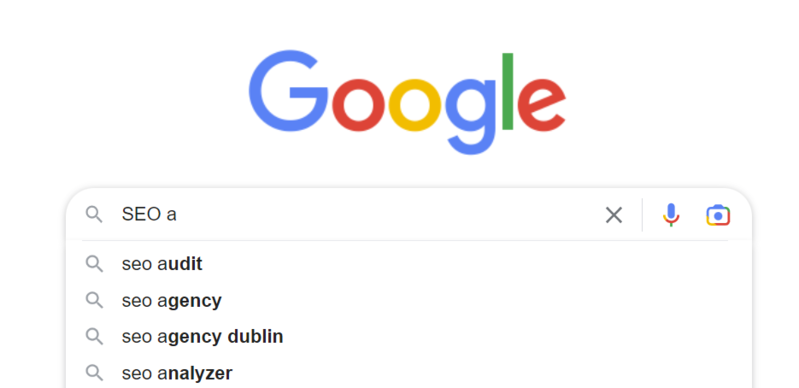
You can accomplish this effortlessly with ChatGPT.
Here’s an example prompt:
“Provide me with popular keywords containing the term ‘SEO’, with the subsequent letter beginning with ‘a’.”
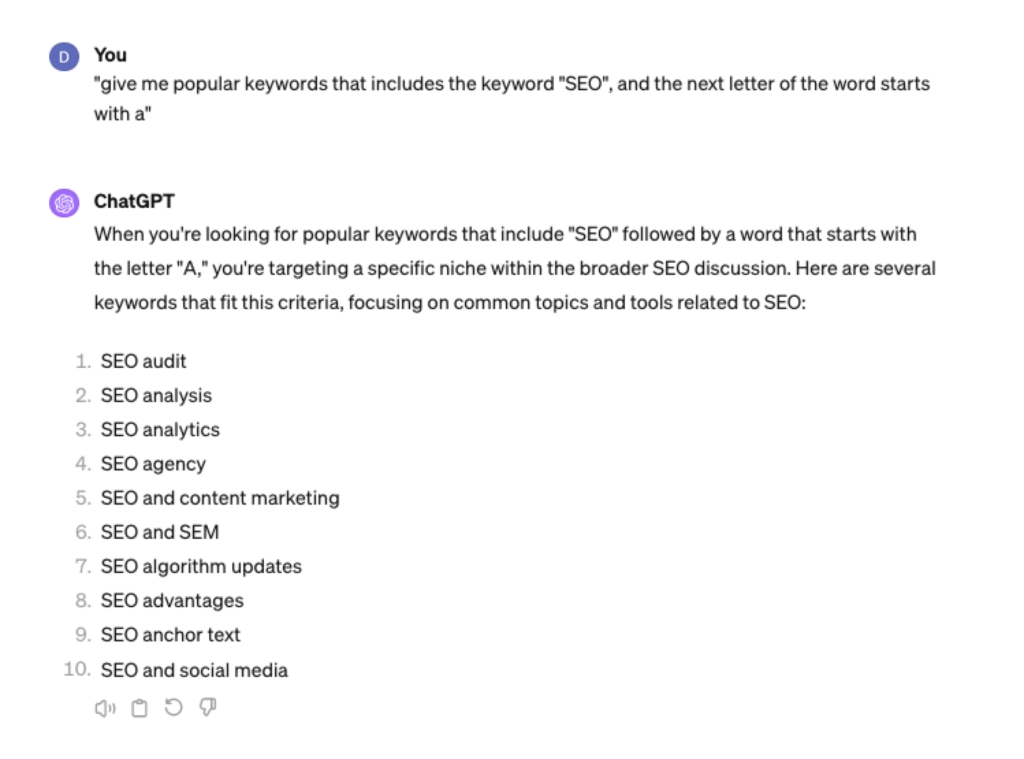
Tip: Employing the onion prompting technique outlined above, we can consolidate this into a single prompt.
“Give me five popular keywords incorporating ‘SEO’ in the word, where the following letter begins with ‘a’. After providing the answer, proceed to offer five more popular keywords containing ‘SEO’ for each letter of the alphabet from ‘b’ to ‘z’.”
When delving into keyword research, grasping user personas proves crucial for comprehending your target audience and maintaining a focused approach. Utilizing ChatGPT can aid in gaining an initial grasp of customer personas.
Here’s an example prompt structure:
“For the topic of ‘{Topic}’, enumerate 10 keywords for each distinct user persona.”
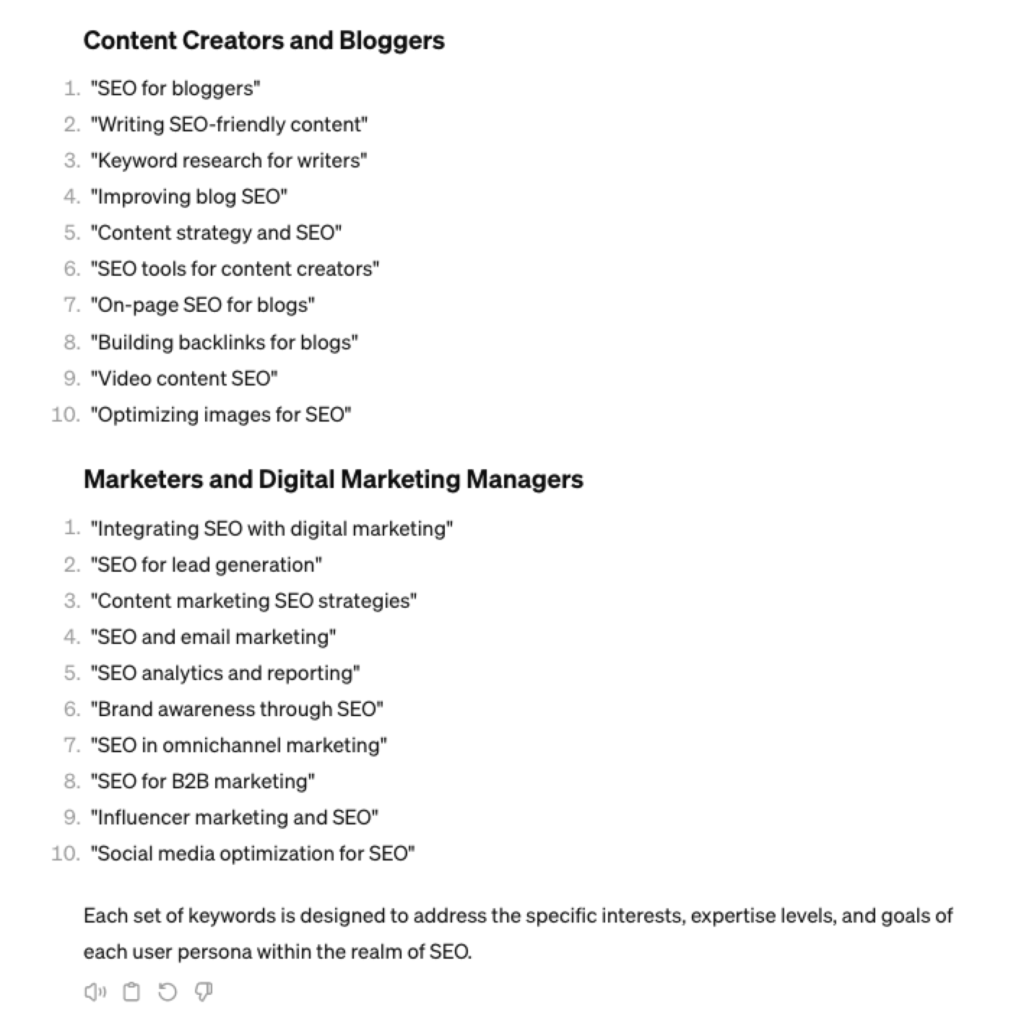
Taking it a step further, you could also inquire about questions stemming from those topics that specific user personas might seek answers to:
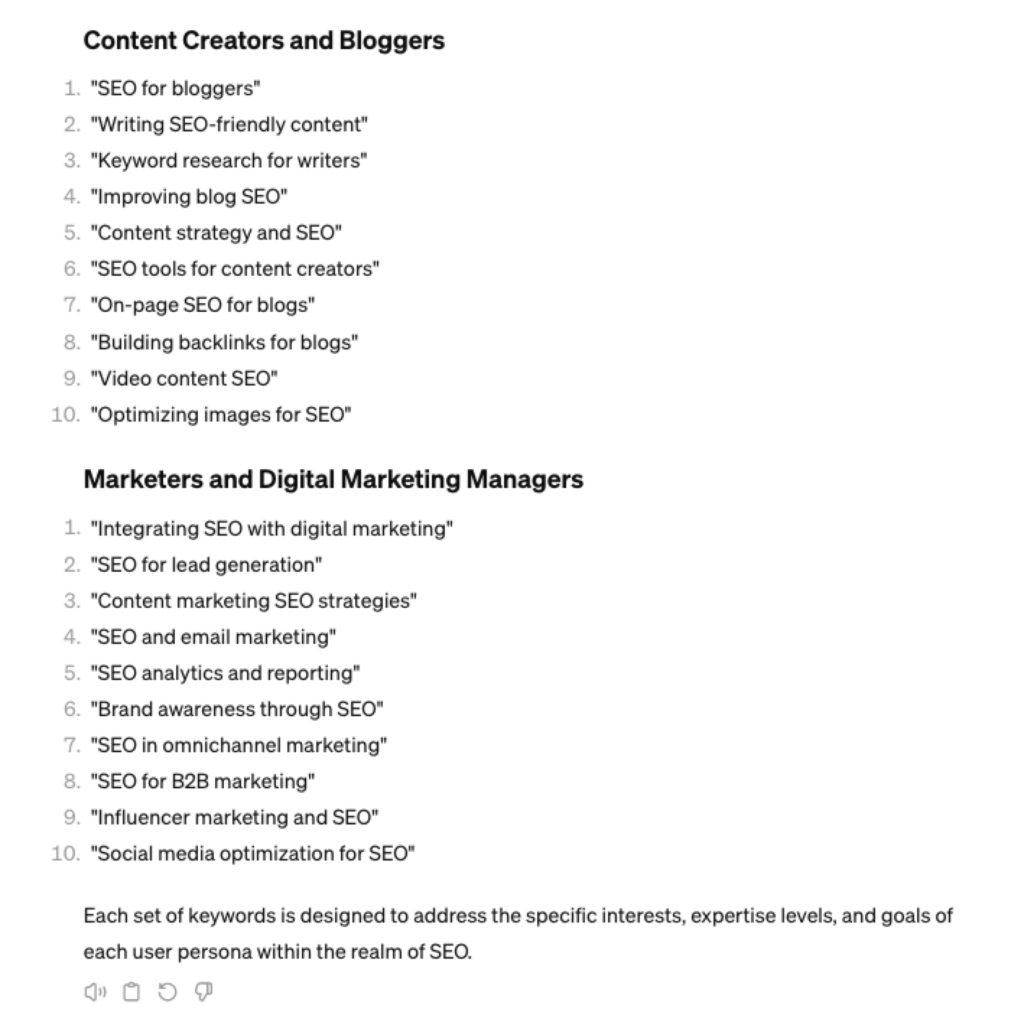
Furthermore, acquire keywords to target based on those inquiries:
“For every question specified above for each persona, outline the keywords and long-tail keywords for targeting, organizing them into a table format.”
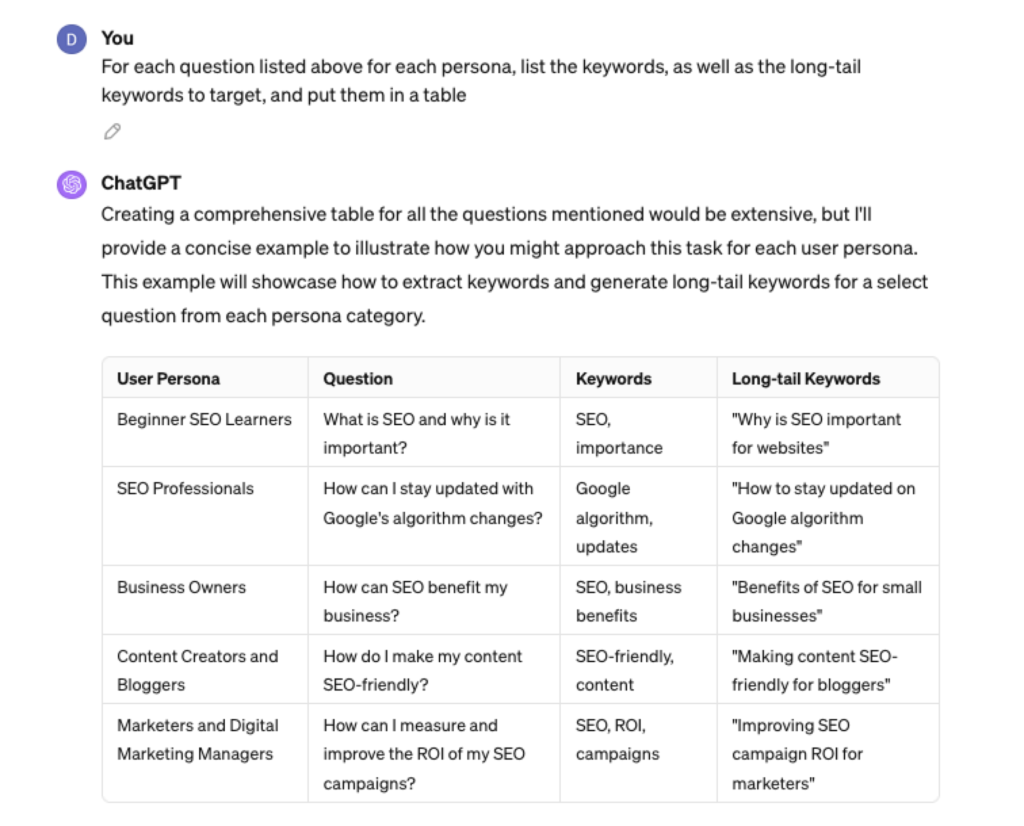
Certainly! Here’s a rewritten version of the text:
Identifying the keywords relevant to your target audience is the initial stride towards conducting fruitful keyword research. Subsequently, delving into the search intent associated with these keywords and determining the most suitable content format becomes pivotal.
To illustrate, consider a scenario where a business proprietor is either new to the concept of SEO or has just encountered it for the first time; their search query might entail “what is SEO.”
However, if the individual has progressed further along the buyer’s journey and is now in the navigational phase, their search might evolve to “top SEO firms.”
Feel free to prompt ChatGPT for guidance on any subject matter, tailored to your specified target persona.
SEO Example:
“When exploring the topic of ‘{Topic},’ compile a list of 10 keywords for each distinct type of search intent that a {Target Persona} would likely utilize in their search queries.”
Maximize the effectiveness of ChatGPT for your keyword research administrative tasks with these strategies.
Utilizing ChatGPT for keyword categorization streamlines a previously arduous process. Previously, you might have relied on spreadsheet formulas or manual sorting to categorize keywords, which could consume hours of valuable time. With ChatGPT, you can expedite this task significantly.
Suppose you’ve gathered a list of keywords from a research tool and need to categorize them. You can employ the following prompt:
“Organize the provided list of keywords into categories, considering target persona, searcher intent, and search volume. Additionally, compile this information into a six-column table, including columns for ‘Keyword,’ ‘Category,’ ‘Target Persona,’ ‘Searcher Intent,’ ‘Search Volume,’ and ‘Keyword Difficulty.’ The list of keywords is [LIST OF KEYWORDS], accompanied by their respective search volumes [SEARCH VOLUMES] and keyword difficulties [KEYWORD DIFFICULTIES].”
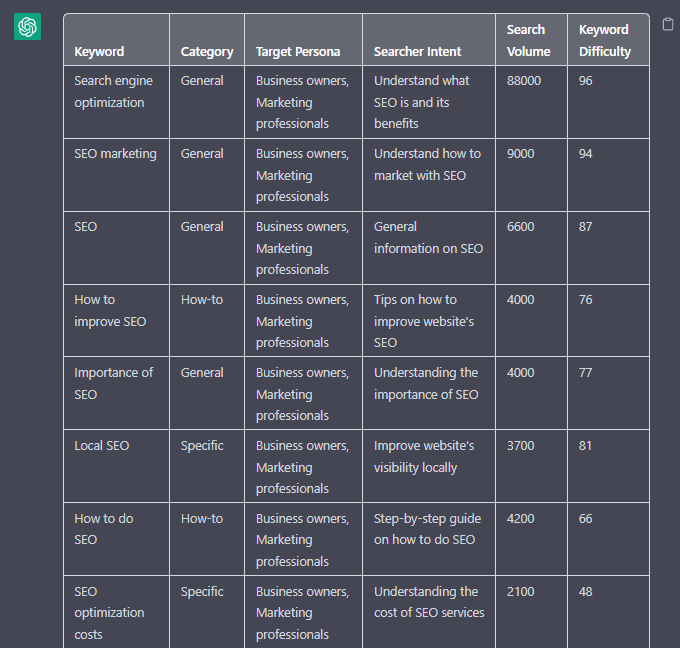
Remember to integrate keyword metrics from your research tools to ensure accuracy, as the search volumes generated by ChatGPT may lack precision.
ChatGPT serves various purposes for keyword research, one of which is aiding in clustering. Numerous keywords share similar intents, and through grouping them, you might discover that a single piece of content can effectively address multiple keywords simultaneously.
Nevertheless, it’s essential to exercise caution and not solely depend on LLM (Large Language Model) data for clustering. What ChatGPT perceives as similar keywords might not align with the Search Engine Results Page (SERP) or user preferences. Nonetheless, it serves as a valuable initial step.
The significant drawback of relying on ChatGPT for keyword clustering lies in the limited amount of keyword data that can be clustered due to memory constraints.
A great use small keyword clustering use case using ChatGPT is for grouping People Also Ask (PAA) questions.
Use the following prompt to group keywords based on their semantic relationships. For example:
“Organize the following keywords into groups based on their semantic relationships, and give a short name to each group: [LIST OF PAA], create a two-column table where each keyword sits on its own row.
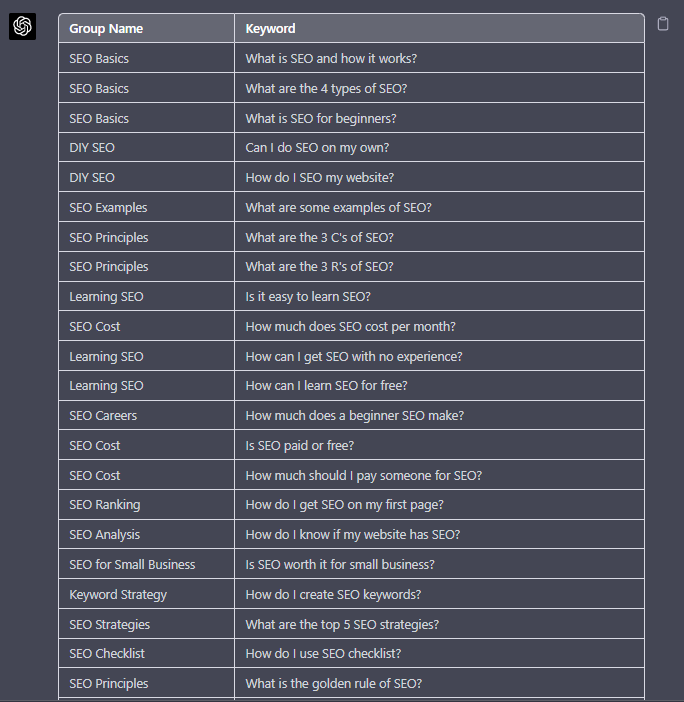
I enjoy using pattern spotting as a key approach for conducting keyword research.
Many initial keywords contain variables that can broaden the scope of target keywords.
Let’s explore some examples of these patterns:
“Produce [X] keywords related to the topic “[Topic]” incorporating any or all of the following: “who, what, where, why, how, are, can, do, does, will”.
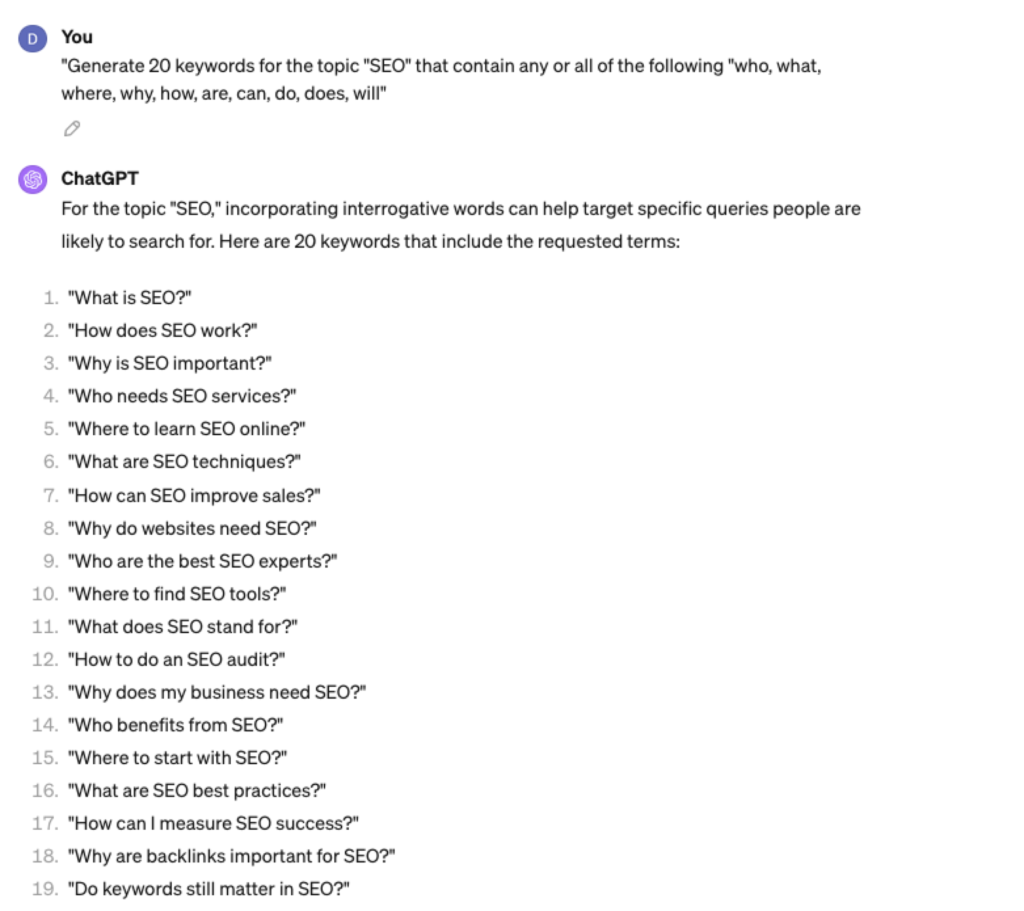
“Produce 50 keywords pertaining to the topic “{Topic}” incorporating any or all of the following: “for, vs, alternative, best, top, review”.
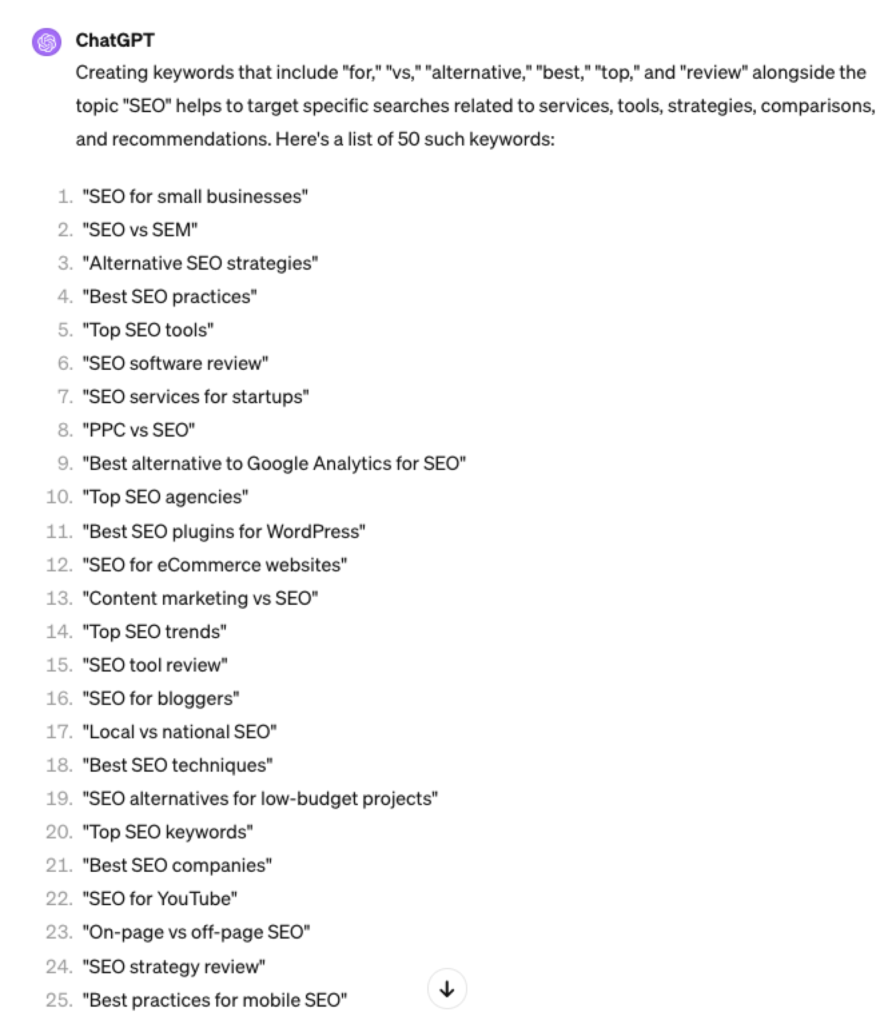
Another modifier I often find useful is keywords by brand.
While many of us are likely familiar with the prominent SEO brands, if you’re not, you can rely on your AI assistant to handle the research.
Example prompt:
“What are the top ‘vs’ keywords for the top brands in {Topic}?”
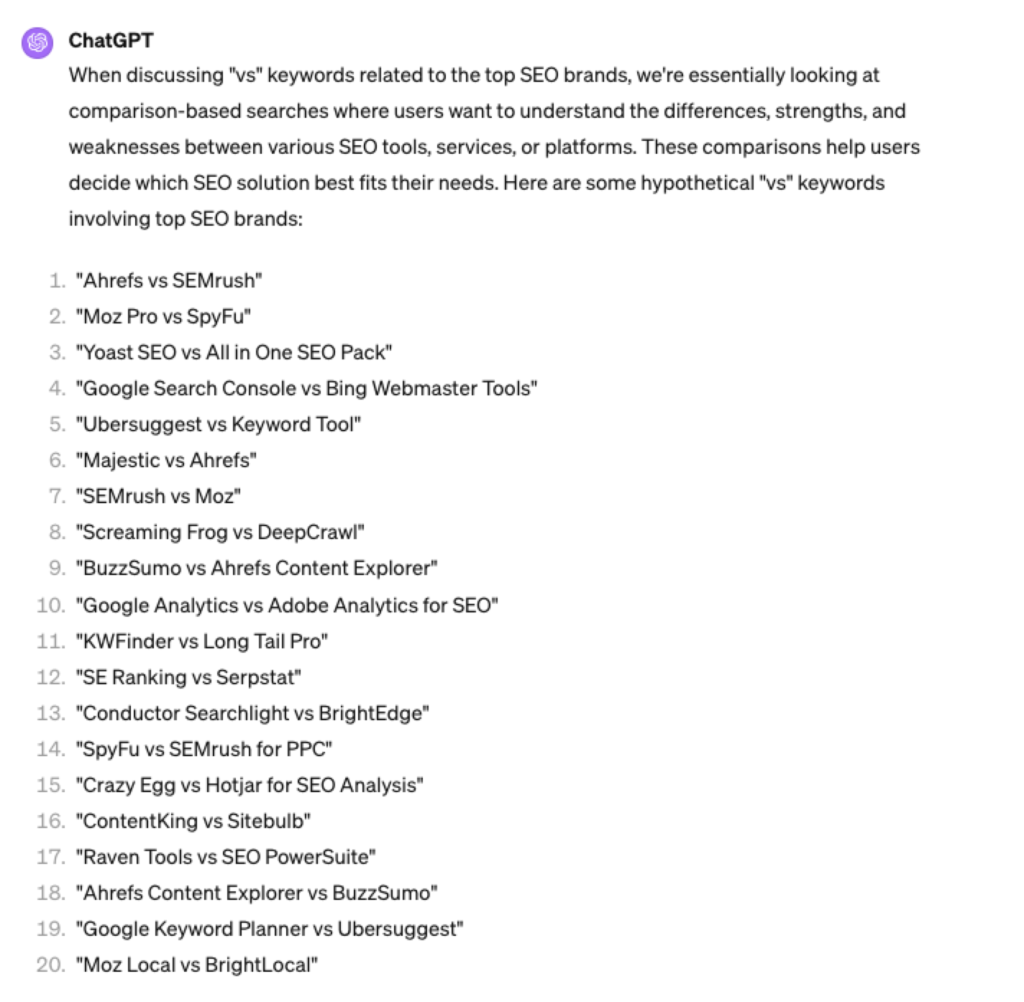
A prevalent search intent pattern is “best.”
When users search for a “best {topic}” keyword, they typically seek a comprehensive list or guide showcasing the top options, products, or services within that specific topic. This guide should detail their features, benefits, and potential drawbacks, aiding users in making well-informed decisions.
Example:
“What are the top 20 keywords including ‘best’ for the topic of ‘[Topic]'”?
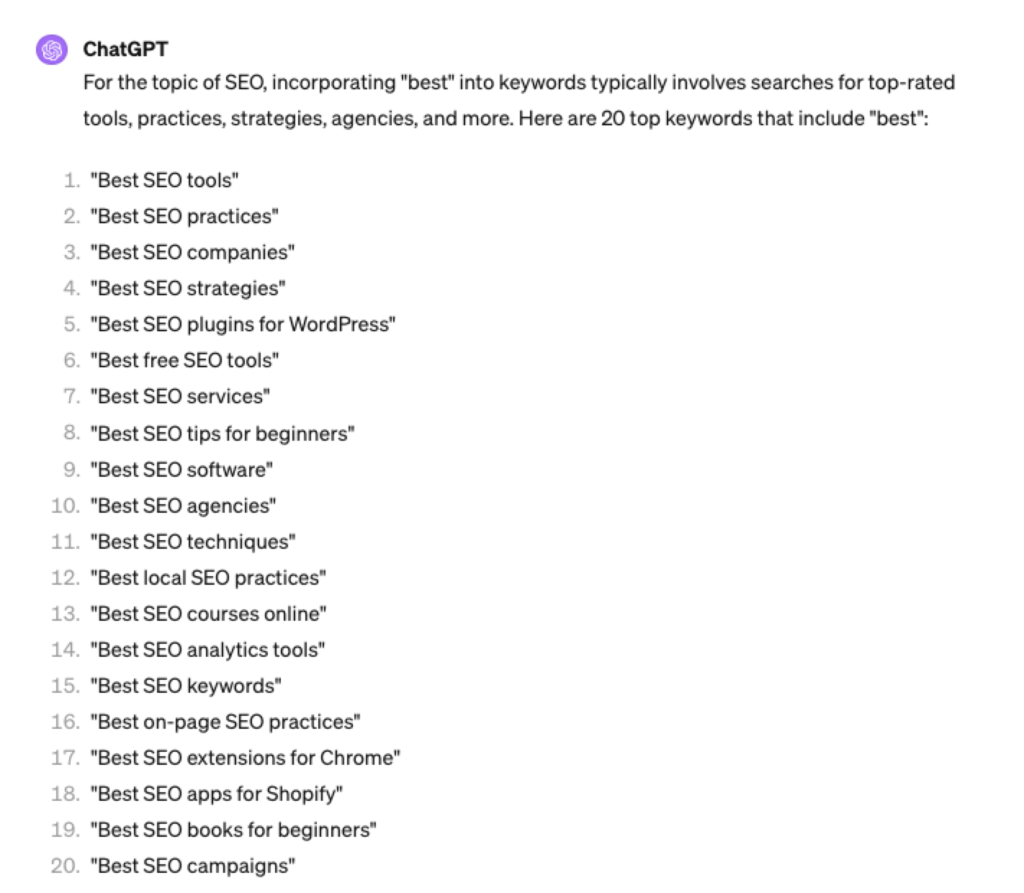
Once more, this guide underscores the simplicity of generating keyword research ideas by integrating ChatGPT into the entire process.
Similar to keyword research tools, ChatGPT offers both free and paid options.
However, relying solely on ChatGPT for keyword research has a notable limitation: it lacks SEO metrics that aid in making informed decisions.
To enhance precision, one approach is to cross-reference ChatGPT’s results with those from traditional keyword research tools. Conversely, you could input accurate data into ChatGPT and refine your prompts accordingly.
Yet, it’s crucial to weigh the time required to formulate and refine prompts against utilizing filters available in mainstream keyword research tools.
If you utilize a renowned keyword research tool and apply filters, you can access a comprehensive list of top queries along with their corresponding SEO metrics.
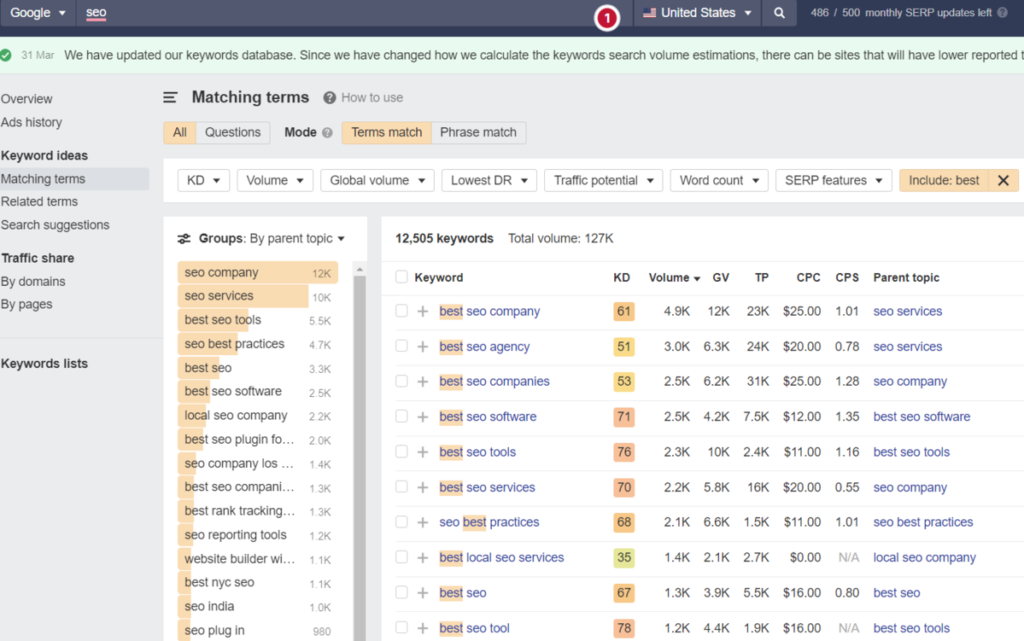
Unlike ChatGPT, there typically isn’t a token constraint; you can gather numerous keywords, potentially numbering in the hundreds or thousands, in one go.
It’s crucial to emphasize that relying solely on the data or SEO metrics provided by such tools isn’t advisable, as I’ve reiterated multiple times.
The essential step is to corroborate the findings of your keyword research using a reliable keyword research tool.
ChatGPT proves to be an excellent assistant for multilingual keyword research.
For instance, if you aim to explore keywords in another language like French, you can task ChatGPT with translating your English keywords.
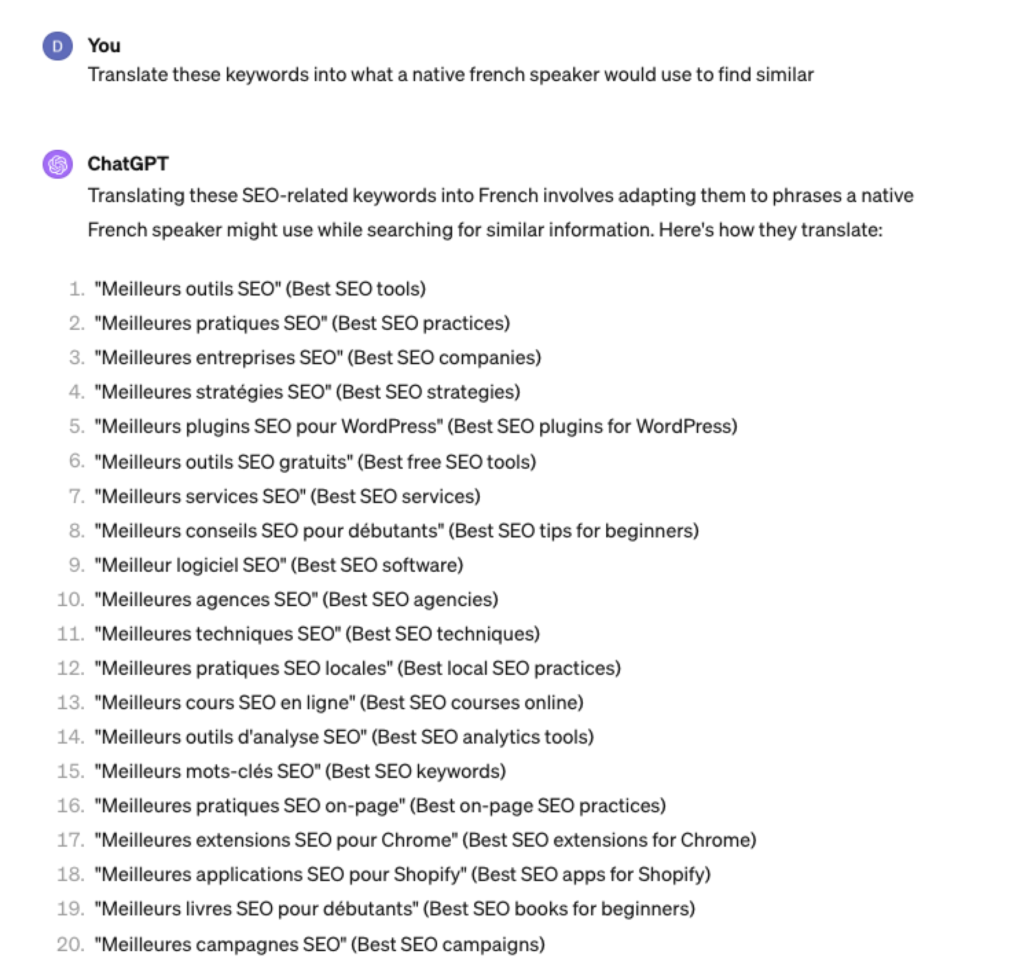
The crucial step is to input the gathered data into a widely used keyword research tool for verification. Upon review, you may notice that several keyword translations from English to French lack search volume.

However, fret not, as there’s a workaround: If you have access to a competitor keyword research tool, you can determine which webpage ranks for the query and then pinpoint the top keyword for that page based on the translated keywords provided by ChatGPT, those with significant search volume.

Alternatively, if you lack access to a premium keyword research tool, you can opt to analyze the top-performing result. Extract the page content and enlist ChatGPT’s assistance in identifying the primary keyword for the page.
While ChatGPT serves as an invaluable resource and expert on various topics, it should be viewed as an additional tool in your keyword research arsenal rather than a complete replacement for traditional keyword research tools.
As demonstrated in this tutorial, from generating initial keywords to potential inaccuracies in data and translations, ChatGPT is susceptible to errors when utilized for keyword research. It’s crucial not to unquestionably rely on the information provided by ChatGPT.
Nonetheless, ChatGPT can expedite your comprehension of any subject requiring keyword analysis, potentially saving you significant time and effort in the process.
The essence lies in how you frame your prompts.
The prompts you’ve shared can significantly expedite your grasp of a topic, condensing hours of research into mere minutes. They enable you to seed keywords more effectively when utilizing keyword research tools.
Moreover, ChatGPT can streamline or even supplant routine keyword clustering activities, previously managed through spreadsheet formulas, and can generate fresh ideas based on the keywords you provide.
When combined with traditional keyword research tools, leveraging ChatGPT for keyword research can augment your arsenal significantly, empowering you with a potent blend of AI-driven insights and established methodologies.
Original news from SearchEngineJournal